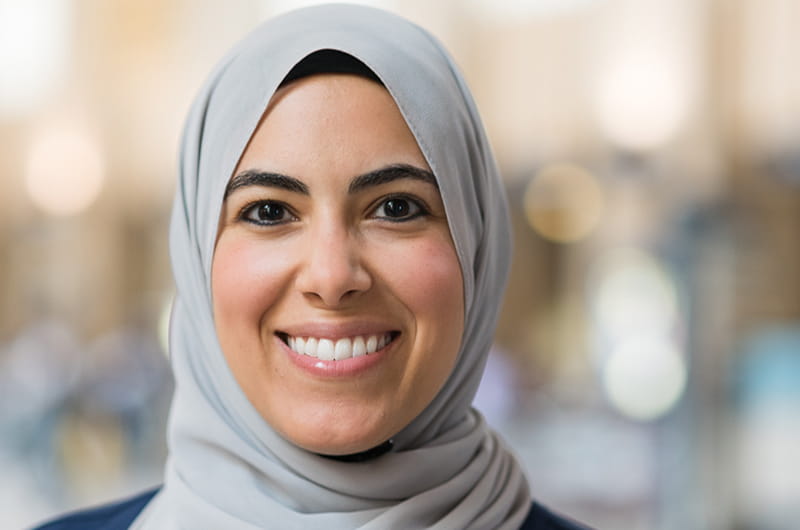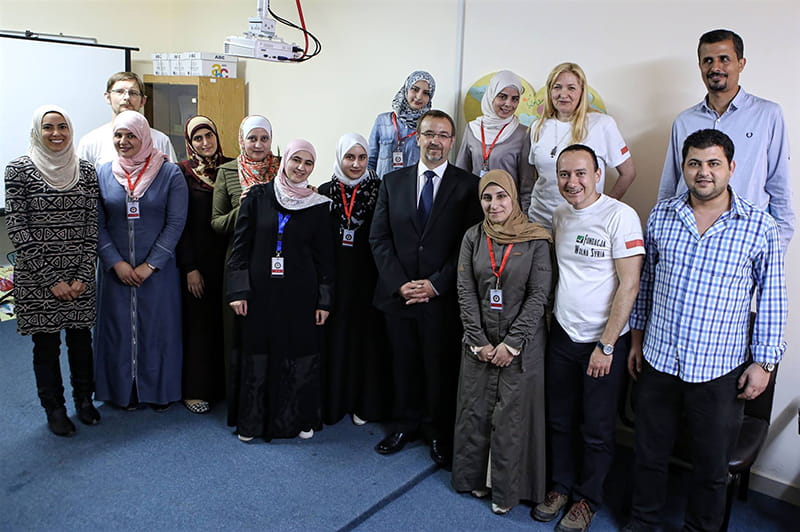Meet a Drexel Student Who Used Her Clinical Psychology Education to Combat Suffering of Syrian Refugees in Jordan

Mona Elgohail, a PhD candidate in the clinical psychology program in Drexel University’s College of Arts and Sciences, came to Drexel with the goal of alleviating human suffering. So, she decided to travel to what she saw as suffering’s ground zero — a mental health clinic in Irbid, Jordan where she worked with Syrian refugees to combat the mental health problems brought about by the violence, displacement and loss they experienced.
Elgohail spoke with DrexelNow about how her Drexel education prepared her for this experience, and why other students should think big and realize their potential impact on global crises.
Q: Tell us about your academic career thus far, along with what originally made you interested in clinical psychology and in Drexel?
A: During my first week at a prestigious high school, the principal called me into his office and told me to choose between my education and my religion. “Mona, you cannot wear your religious headscarf with the school uniform,” he said. I learned at a young age that the blending of cultures can be messy. As the daughter of Muslim-Egyptian immigrants, I did not fit neatly into my predominantly Caucasian hometown in New Jersey — especially after I began wearing hijab in 2002. After working tirelessly to get into a specialized high school, I was forced to make a difficult choice. Ultimately, I decided to retain a cherished part of my Muslim identity — my hijab — and leave the school. But I did not give up on pursuing a rigorous education; I worked harder. I enrolled in a public high school and — four years later — graduated as valedictorian with acceptance to Barnard College of Columbia University.
My steep path to higher education gave me the courage to challenge norms and move beyond predefined labels and limits. This experience and many others compelled me to explore my unique identity — a blend of my American, Egyptian and Muslim values. I became more self-reflective and developed the skills needed to better understand others. My multicultural journey also instilled in me a desire to address the needs of underserved populations.
Today, my fierce curiosity and fervent commitment to social justice are assets that continue to guide my career as a clinical psychologist. I came to Drexel with a strong interest in women’s health psychology and the goal of alleviating suffering, especially among people from underserved backgrounds, through practice and research. One of the main reasons I chose Drexel is to work with my advisor, Pamela Geller, PhD, who has studied women’s health issues for over 25 years. Her work focuses on the psychological aspects of events surrounding pregnancy and childbirth, such as infertility, pregnancy loss and postpartum depression. Under Dr. Geller’s mentorship, my research has examined the infertility and pregnancy experiences of minority women.
Q: How and why did you start this work providing mental health services to Syrian refugees in Jordan?
A: The Syrian war is by far the worst humanitarian crisis of our time. In 2016, the United Nations estimated that more than 400,000 Syrians had died because of the conflict. More than 6.6 million people have been displaced internally and over 5.6 million have sought refuge abroad, with over 670,000 in Jordan alone. Syria’s pre-war population was over 20 million, meaning half of Syrians have been displaced — the largest displacement of people since WWII.
It was hard for me to sit on the sidelines, simply reading about the war in the news. I wanted to alleviate some of the suffering in whatever way I could with the skills I had. And in retrospect, in many ways, going to Jordan was therapeutic for me. Being able to contribute in a positive way helped me cope with what was going on.
With the help and support of my advisor, Dr. Geller, I wrote a letter to the director of clinical training and chair of our department to request approval for a yearlong independent study that would allow me to volunteer my time at a mental health clinic for Syrian refugees in Jordan. My proposal was completely nontraditional, as graduate students in my program usually seek clinical training in the greater Philadelphia area, not another country. Not only did our department leaders recognize the importance of the work outlined in my proposal, but they and the rest of the faculty celebrated and supported it.

Q: What was it like working with and also learning from this population and in this area? Are there things that you realized there that you now wish more people in the U.S. knew about the conflict in Syria?
A: Working at the Syrian American Medical Society (SAMS) Foundation’s mental health clinic was by far the most emotionally challenging experience that I've had. One of the first stories I heard on my first day was about a woman whose husband, son and nephew were killed in front of her by Syrian government forces, and then her house was broken into and her mother was killed in the middle of the night. Another account was from a woman who went out to buy yogurt for her family just before a bomb struck her home. She lost her parents and all of her siblings except for one sister who lived elsewhere.
All of the refugees that I met had these types of stories. I don’t think I met a single family there that was completely intact, where the entire family was able to find refuge in Jordan all together. It took every ounce of strength to remain composed while hearing their stories. The brutality is unimaginable.
I also learned that, in addition to the trauma from back home, most of the Syrians experience significant difficulties as refugees in Jordan. It’s illegal for refugees to work, and if they’re caught working, they’re forcefully deported back to Syria. They are not allowed to attend public schools, and they don't have access to healthcare outside of what the UNHRC provides, which is only basic primary care to refugees in the camps.
Due to the horrific conditions within the camps, most refugees in Jordan have fled from the camps, filling the slums of urban cores. Essentially, the Syrian crisis has created a lost generation — children can’t get an education, parents can’t work and many families keep getting sicker. How are they supposed to rebuild and improve their lives under these conditions? Fortunately, it seems that conditions have somewhat improved since my yearlong study in Jordan in 2016.
Q: What were you able to help your patients in Jordan with through your work?
A: Between the horrors they experienced in Syria and the ongoing challenges of refugee life, Syrian refugees are a deeply traumatized population with extraordinary mental health needs. The SAMS mental health clinic in Irbid, Jordan serves Syrian refugees of all ages. Some of the most common psychological problems were depression, anxiety, post-traumatic stress disorder and somatoform disorders. My role involved observing and co-facilitating group therapy for women and children. I provided supportive psychotherapy and psychoeducation on anxiety, depression, trauma, parenting strategies and stress management strategies. My work was supervised by Gregory Lewis, PsyD, a trauma expert with experience helping asylum seekers for over a decade and providing psychotherapeutic services to Syrian refugees in Jordan.
Q: Why might you encourage other students like you to seek these types of intense, real-world experiences?
A: I went to Jordan to help Syrian refugees, but what these individuals gave me was more than I could ever give them. They taught me and inspired me through their stories, their perseverance, their gratitude and their hospitality. They helped me develop my worldview, and I’m a better clinician and a better human because of it. It’s true what they say: in helping others, you help yourself.
Unfortunately, the current rhetoric in the U.S. surrounding refugees is loaded with misinformation, fearmongering and xenophobia. I hope students and Americans in general will at the very least educate themselves about the conflict. I also encourage people to partner with local organizations that are helping refugee families resettle with dignity in the U.S. There are also national organizations doing great work in helping Syrian refugees, such as the SAMS Foundation, Islamic Relief and Zakat Foundation.
Q: How do you think you'll utilize what you experienced and learned there in your future career?
A: My experiences with refugees have inspired me to pursue work with trauma survivors, especially female survivors. I’m particularly interested in the effect of previous traumatic experiences on the perinatal period, the impact of maternal lifetime trauma on child development, the prevention of intergenerational consequences of trauma and models for early intervention. I’m currently completing a predoctoral internship at Rush University Medical Center, where a portion of my time is spent in the Center for Women’s Behavioral and Mental Health treating distress and trauma associated with women’s reproductive and sexual health concerns.
In This Article
Drexel News is produced by
University Marketing and Communications.

